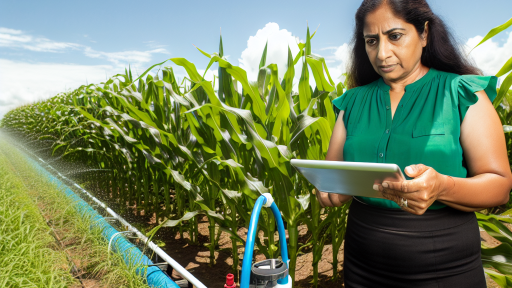Understanding Tax Obligations: An Overview for Farmers
Importance of Tax Awareness
Farmers must understand their tax obligations to operate successfully.
Tax compliance directly affects financial health.
Being proactive can prevent costly penalties.
Types of Taxes for Farmers
Farmers face various taxes including income and property taxes.
Sales tax applies to certain agricultural products as well.
Understanding these taxes can minimize liabilities.
Income Tax
Farmers report income tax based on net profit from farming activities.
They can deduct certain expenses, which reduces taxable income.
Property Tax
Property taxes vary by state and local jurisdiction.
Farmers should review assessments to ensure accuracy.
Record Keeping for Tax Purposes
Accurate record keeping is critical for farmers.
A good system allows farmers to track income and expenses effectively.
Using accounting software can simplify this process.
Expense Documentation
Farmers should document all expenses with receipts.
Routine expenses include seeds, equipment, and labor costs.
Transform Your Agribusiness
Unlock your farm's potential with expert advice tailored to your needs. Get actionable steps that drive real results.
Get StartedIncome Tracking
Farmers must consistently track income from sales.
This information is vital for accurate tax reporting.
Seeking Professional Assistance
Many farmers benefit from consulting a tax professional.
These experts offer guidance on complex tax issues.
Finding a knowledgeable CPA can save time and money.
Choosing the Right Professional
Look for CPAs with experience in agricultural taxes.
Check their credentials and ask for referrals.
Key Tax Deductions Available to Farming Operations
Understanding Tax Deductions
Tax deductions can significantly reduce farming expenses.
Farmers must identify which deductions apply to their operations.
Greater awareness leads to improved tax filings and savings.
Operating Expenses
Farmers can deduct routine operating expenses.
This includes costs associated with seeds, feed, and fertilizers.
Additionally, insurance premiums are deductible, lowering overall expenses.
Furthermore, repairs and maintenance on equipment qualify for deductions.
Depreciation of Assets
Depreciation allows farmers to spread the cost of assets over multiple years.
Machinery, vehicles, and buildings qualify for depreciation deductions.
Section 179 allows immediate expensing of up to a certain amount.
This can greatly benefit cash flow in the current tax year.
Land and Property Taxes
Farmers can deduct property taxes on agricultural land.
This deduction can help offset the costs of owning property.
Real estate taxes on farm buildings also qualify for deductions.
Labor Costs
Wages paid to farm workers are deductible expenses.
Employers can also deduct costs for employee benefits.
This includes health insurance and retirement contributions.
Showcase Your Farming Business
Publish your professional farming services profile on our blog for a one-time fee of $200 and reach a dedicated audience of farmers and agribusiness owners.
Publish Your ProfileInterest on Loans
Businesses can deduct interest on loans for agricultural purposes.
This includes loans for purchasing machinery or land.
Interest paid on operating loans is also deductible.
Energy and Utilities
Farmers incur various energy costs that can be deducted.
This includes electricity and fuel expenses for equipment.
Additionally, heating costs for barns and storage facilities are eligible.
Educational and Training Expenses
Training and educational programs for farmers can be deducted.
These expenses enhance skills and improve farming practices.
This shows a commitment to growth and development in agriculture.
Charitable Contributions
Farmers can deduct charitable contributions to qualified organizations.
This includes donations of food and crops to food banks.
Making charitable donations can result in significant tax savings.
The Importance of Record-Keeping in Agriculture Tax Filing
Accurate Records Make Tax Preparation Easier
Accurate record-keeping simplifies tax preparation for farmers.
It ensures you have all necessary documents at hand.
Consequently, you can avoid last-minute scrambles for information.
In addition, solid records support precise income reporting.
Enhancing Financial Decision-Making
Effective record-keeping enhances financial decision-making.
It provides a clear view of your farm’s financial health.
This clarity aids in evaluating profit margins and expenses.
Furthermore, it helps identify areas for potential cost savings.
Demonstrating Compliance with Tax Laws
Proper record-keeping demonstrates compliance with tax laws.
Farmers can present a solid case in case of audits.
Keeping detailed records establishes a history of your operations.
In turn, this history supports the legitimacy of your claims.
Types of Records to Maintain
It is crucial to maintain various types of records.
- Maintain financial statements for business transactions.
- Keep track of crop production and sales receipts.
- Document equipment purchases and maintenance records.
- Record seed, fertilizer, and pesticide expenses.
Utilizing Technology for Record-Keeping
Technology offers innovative solutions for record-keeping.
Software applications streamline the organization of financial data.
Cloud-based tools ensure accessibility from any location.
Moreover, digital records reduce the risk of loss or damage.
Reviewing and Updating Records Regularly
Regular reviews of records reinforce their accuracy.
Schedule periodic audits of your financial documentation.
Additionally, consistent updates accommodate changes in operations.
This practice ensures your records reflect the current state of affairs.
Uncover the Details: Differences Between Organic And Conventional
Navigating State vs. Federal Tax Regulations for Farmers
Understanding Federal Tax Obligations
Farmers must comply with federal tax laws.
The IRS governs these regulations for agricultural businesses.
Sales, income, and self-employment taxes apply to all farmers.
Proper record-keeping is essential to meet federal requirements.
Farmers can benefit from several specific deductions.
For example, they can deduct expenses for equipment and supplies.
Showcase Your Farming Business
Publish your professional farming services profile on our blog for a one-time fee of $200 and reach a dedicated audience of farmers and agribusiness owners.
Publish Your ProfileAdditionally, conservation expenses may also be deductible.
Section 179 offers a way to maximize these deductions.
Moreover, farmers should understand the implications of subsidies.
Federal subsidies may impact their overall tax liability.
State-Specific Regulations
Every state has unique tax regulations for farmers.
Understanding these nuances is crucial for compliance.
Some states provide agricultural tax exemptions.
Farmers should investigate what applies to their state.
Researching local tax credits can yield significant savings.
Sales tax may not apply to certain farming equipment.
Consulting with a tax professional can clarify these issues.
Always stay current with changes in state laws.
State revenue departments usually publish updates.
Balancing State and Federal Requirements
Farmers must align state and federal requirements.
This ensures compliance and maximizes potential benefits.
This alignment can be complex, requiring careful planning.
Relation to federal forms is critical when filing state taxes.
Farmers should check if their state allows federal deductions.
This can simplify the tax filing process.
A tax advisor with agriculture experience can assist greatly.
Establishing a solid bookkeeping system facilitates compliance.
Finally, farmers should consider periodic audits.
This can identify any discrepancies or areas for improvement.
Explore Further: Choosing The Right Organic Certification Body
Tax Credits: How Farmers Can Benefit and Qualify
Understanding Tax Credits
Tax credits reduce the amount of tax you owe.
Farmers can use these credits to lower their tax burdens significantly.
Moreover, tax credits can incentivize practices that benefit the environment.
Understanding the requirements is crucial for maximizing benefits.
Types of Tax Credits Available
Farmers can access various tax credits.
- The Renewable Energy Tax Credit supports sustainable energy practices.
- The Conservation Reserve Program (CRP) credits help landowners maintain conservation efforts.
- The Agriculture Research Service (ARS) credits fund research-related expenses.
Each of these credits has specific eligibility criteria and application methods.
Qualifying for Tax Credits
Qualifying for tax credits requires careful documentation.
Farmers must maintain accurate records of their farming activities.
Additionally, understanding the specific requirements for each credit is essential.
Consulting with a tax professional can prove beneficial.
Filing for Tax Credits
To claim tax credits, farmers must complete the appropriate forms.
Many credits require attaching supporting documents to your tax return.
Being thorough ensures all potential credits are obtained.
Resources for Farmers
A variety of resources exist to guide farmers through tax credits.
- The USDA offers comprehensive information on agricultural tax credits.
- Local extension offices provide assistance with tax preparation.
- Specialized accounting firms can help navigate complex tax requirements.
Accessing these resources can streamline the tax filing process.
See Related Content: Essential Export Documentation for Farmers
Showcase Your Farming Business
Publish your professional farming services profile on our blog for a one-time fee of $200 and reach a dedicated audience of farmers and agribusiness owners.
Publish Your Profile
Timing Your Tax Filing: Important Deadlines and Extensions
Understanding Tax Deadlines
Tax deadlines play a crucial role in your financial planning.
Each year, the IRS sets specific deadlines for tax filings.
Your farm’s income and expenses are tied to these dates.
Be aware of the regular and extended deadlines.
Failing to meet these deadlines can result in penalties.
Key Filing Dates
Typically, the tax filing deadline for farmers falls on April 15.
If you miss the initial deadline, you have options for extension.
Filing for an extension gives you until October 15 to submit.
However, remember that this doesn’t extend your payment due date.
Make sure to estimate and pay any taxes owed by April 15.
Applying for Extensions
If you need more time, filing Form 4868 is essential.
This form allows you an automatic six-month extension.
Keep in mind, this only applies to the filing date.
You still need to pay your estimated taxes to avoid penalties.
Consider speaking with a tax professional for guidance.
Precise Record-Keeping
Accurate records are vital for timely filings.
Organize your income and expense documents year-round.
Utilize accounting software to simplify this process.
Regularly review your financial status as deadlines approach.
This proactive approach alleviates stress during tax season.
Impact of Federal and State Changes
Stay informed about changes in federal and state tax laws.
Different regions may have unique filing regulations and deadlines.
Subscribe to updates from the IRS and your state tax agency.
This helps ensure compliance and optimize your tax strategy.
Consult with a local accountant for region-specific advice.
Explore Further: How Biotechnology Regulations Impact Modern Farming
The Role of Farm Income Averaging in Tax Planning
Understanding Farm Income Averaging
Farm income averaging helps farmers manage their tax liability effectively.
This strategy smooths income over several years.
As a result, it can lower overall tax rates.
Farmers can use this method to avoid high taxes during profitable years.
Furthermore, it helps stabilize income during lean years.
Eligibility for Farm Income Averaging
To qualify, farmers must have an average gross income of $5,000.
Eligible farmers can spread their income over a three-year period.
Eligible income stems from farming operations.
Any claimed income must come from an approved source.
Moreover, it only applies if farming makes up a significant portion of income.
Calculating Farm Income Averaging
Calculating your average involves a few simple steps.
First, total your income for the current year.
Next, include the incomes from the previous two years.
Then, divide the total by three to find the average.
Showcase Your Farming Business
Publish your professional farming services profile on our blog for a one-time fee of $200 and reach a dedicated audience of farmers and agribusiness owners.
Publish Your ProfileFinally, adjust your tax returns accordingly.
Benefits of Farm Income Averaging
The primary benefit is reduced tax liability in profitable years.
It helps with cash flow management during tough times.
Additionally, it prevents spikes in taxable income.
As a result, farmers can plan better for future expenses.
Ultimately, this strategy supports sustainable farming practices.
Considerations Before Implementing Income Averaging
Farmers should assess their entire financial situation first.
Consider both short-term and long-term financial goals.
Consulting with a tax professional is highly recommended.
They can provide tailored advice based on your unique circumstances.
Lastly, remain informed about any changes in tax laws.
Common Tax Mistakes Farmers Should Avoid During Filing
Understanding Tax Deductions
A common mistake is overlooking eligible tax deductions.
Many farmers miss out on deductions for equipment purchases.
Additionally, expenses related to seed, fertilizer, and feed are often neglected.
Knowledge of what qualifies for deductions is crucial.
Failure to Keep Accurate Records
Accurate record-keeping is essential for successful tax filing.
Many farmers fail to track all income and expenses.
This oversight can lead to missed deductions and errors in reporting.
Consider using digital tools to streamline record-keeping processes.
Not Consulting a Tax Professional
Some farmers try to handle taxes without professional help.
This can be risky and lead to costly mistakes.
An expert can provide valuable insights into tax laws and regulations.
Consulting a tax professional may save money in the long run.
Ignoring Tax Credits
Farmers often overlook available tax credits.
These credits can significantly reduce tax liability.
Being aware of federal and state credits can benefit your business.
Make sure to research and apply for all eligible credits.
Inaccurate Reporting of Income
Incorrectly reporting income can lead to audits or fines.
Ensure all sources of income are documented correctly.
This includes sales, subsidies, and other income streams.
Double-check that all figures are accurate before filing.
Missing Tax Deadlines
Missing deadlines can result in penalties and interest fees.
Farmers should mark important tax dates on their calendars.
Planning ahead can help avoid last-minute filing stress.
Consider filing early to reduce the risk of missing deadlines.
Neglecting State Taxes
Farmers often focus solely on federal taxes.
However, state taxes can also impact overall tax liability.
Understand your state’s tax requirements to avoid surprises.
Keep up to date with changes in state tax laws and regulations.
Not Planning for Estimated Taxes
Failing to plan for estimated taxes can lead to payment issues.
Showcase Your Farming Business
Publish your professional farming services profile on our blog for a one-time fee of $200 and reach a dedicated audience of farmers and agribusiness owners.
Publish Your ProfileMany farmers do not realize they may need to pay estimated taxes.
Calculate estimated payments based on projected income.
This strategy helps manage cash flow throughout the year.




